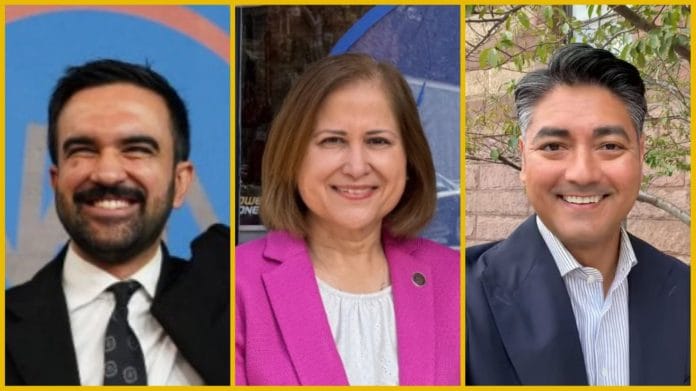New Delhi: The Democrats scored a rebound Tuesday as four US states saw party representatives winning by huge numbers in the first polls since Republican Donald Trump became US President. Moreover, it also signalled a series of firsts for South Asian representation in American politics with three Indian-origin candidates taking charge.
Among the most prominent is New York’s first Muslim mayor Zohran Mamdani, a Democrat whose parents were born in India.
Aftab Pureval, the incumbent mayor of Cincinnati, Ohio, whose father was born in India, retained his post, defeating Republican candidate Cory Bowman, who is incidentally the half-brother of US Vice President J.D. Vance.
In Virginia, Ghazala Hashmi, born in Hyderabad, will be the first Indian-origin Muslim woman to be lieutenant governor, while Democrat Abigail Spanberger won the governor’s post in the state.
In New Jersey, Democrat leader Mikie Sherrill won the governor’s post over Republican Jack Ciattrelli, despite Trump’s endorsement. Sherrill had made opposition to Trump one of her key election agendas.
For a party grappling with low approval ratings and internal divisions after its 2024 losses, Tuesday’s local and state poll results offered a measure of redemption. It is even more significant because US polls earlier this year showed the Democrats losing favour with the people.
However, latest reports, according to The Guardian, signalled a shift after concerns of affordability, rent and local governance were brought back as voting agendas, over nationalist concerns.
Spanberger in Virginia focused on energy costs and affordable healthcare, Sherrill in New Jersey made property taxes and focus on infrastructure her key concerns, as did Mamdani with his focus on affordability, housing and taxing the rich in the US’ financial capital.
Political analysts believe Mamdani’s rise, in particular, symbolises a generational and ideological pivot: a new wave of Left-leaning leaders redefining what the Democratic Party stands for in the post-Trump era.
Also Read: New York, New Comrade. Mayor Mamdani and his India-style socialism
Tensions within Democratic Party
At a post-election discussion hosted by the Department of Communication, Santa Clara University, panellists looked at what Mamdani’s victory reveals about the Democratic coalition and the shifting face of American politics.
Vivian Leung, a political scientist who studies voter behaviour, described Mamdani’s campaign as “a generational earthquake”, built on a broad, multiracial coalition: roughly half of Latino voters, 40 percent of Black voters and comparable levels of support among white liberals.
His campaign, she said, borrowed from “the Obama 2008 playbook”, mobilising younger voters, immigrants, and historically low-turnout communities, especially working-class South Asians in Queens, the Bronx and Brooklyn.
“It saw record engagement from South Asian voters, especially Bangladeshis and Pakistanis, whose turnout rose by 12 percent in the primary,” she added.
Oishika Neogi, a journalist who covers the South Asian diaspora in New York, said Mamdani’s campaign brought the South Asian community as “one, unified force”.
“Until recently, South Asians were often viewed as politically unreliable or too disorganised to be a decisive voting bloc. Mamdani demonstrated that this perception was outdated, especially among working-class South Asians, for whom policies like rent freezes and free bus service make a tangible difference,” she noted.
As a mayoral candidate fluent in Urdu, Bengali, Hindi and even Spanish, Mamdani has marked an important turning point in how politicians engage with immigrant communities.
While he faced online attacks for his criticism of Prime Minister Narendra Modi, Neogi observed an unexpected show of solidarity: “At nearly every fundraiser I attended, there was a huge banner reading ‘Hindus for Zohran’. It confused the mainstream media that Hindus would back a Muslim candidate, but it happened.”
However, Mamdani also battled Islamophobia and xenophobic attacks, especially on X. Raqib Hameed Naik, executive director of Center for the Study of Organized Hate, went on to show data on how more than 35,000 Islamophobic posts targeting Mamdani were made between June and October, reaching an estimated 1.5 billion views on X.
“Much of it framed Mamdani’s Muslim identity through tropes of extremism like conspiracies about Sharia law in New York City, AI-generated images of a so-called ‘Sharia NYC’, even calls for his deportation,” Naik revealed. “And some of that rhetoric came from elected officials.”
The discussion also exposed a deeper tension within the Democratic Party: between the establishment and a rising generation of young progressives.
Leung noted that figures like Senate Majority Leader Chuck Schumer offered little support for Mamdani. “For older Democrats, he represents a fundamental change from what the party has been for 30 years. They don’t see a need to change what’s worked for them,” she noted.
Zahir Janmohamed, a writer and former Congressional staffer, was more direct. “The Democratic Party should be burned down,” he said, half-jokingly. “They’ve consistently kept Muslims, Arabs, and candidates of colour at arm’s length. This is not new.”
As Mamdani quoted first Indian PM Jawaharlal Nehru in his victory speech and said “tonight, we have stepped out from the old into the new”, for many, his victory is more than symbolic.
“This election sits at the intersection of generational change, demographic transformation, and digital politics,” professor Rohit Chopra said, as Leung added: “They (Democrats) have to rediscover their identity as the party of labour and working people.”
(Edited by Nida Fatima Siddiqui)
Also Read: Mamdani signals a shift in American politics. And how immigrants see themselves in it






